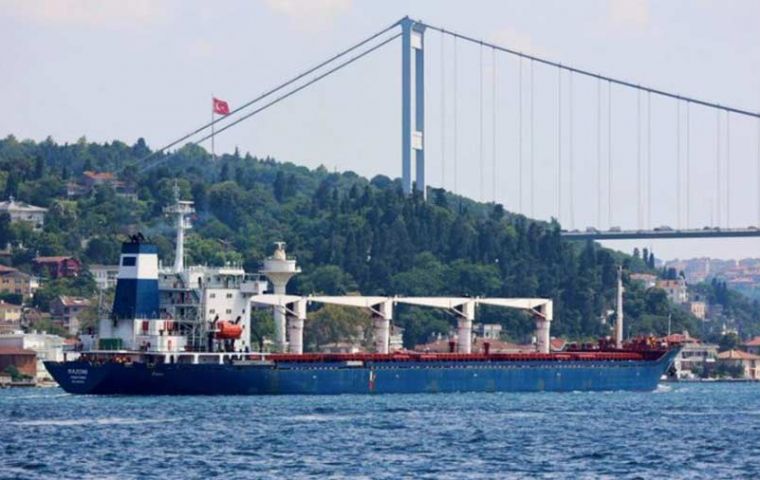MercoPress. South Atlantic News Agency
Black Sea corridor for Ukraine grain exports renewed; Russia expects similar conditions for its fertilizers
 Russia’s foreign ministry confirmed the extension of the Black Sea grain deal for 120 days starting from Nov. 18, without any changes to the current terms
Russia’s foreign ministry confirmed the extension of the Black Sea grain deal for 120 days starting from Nov. 18, without any changes to the current terms The UN and Turkey-sponsored deal aimed at easing global food shortages by facilitating Ukraine’s agricultural exports from its southern Black Sea ports was extended for 120 days last Friday, though Moscow complained that its own demands had not been fully addressed.
The agreement, initially reached in July, created a protected sea transit corridor and was designed to alleviate global food shortages by allowing exports to resume from three ports in Ukraine, a major producer of grains and oilseeds.
“I welcome the agreement by all parties to continue the Black Sea grain initiative to facilitate the safe navigation of export of grain, foodstuffs and fertilizers from Ukraine,” UN Secretary General Antonio Guterres said in a statement.
Guterres said the UN was also “fully committed to removing the remaining obstacles to exporting food and fertilizers from the Russian Federation” – a part of the deal Moscow sees as critical.
Russia’s foreign ministry confirmed the extension of the Black Sea grain deal for 120 days starting from Nov. 18, without any changes to the terms of the current one.
The export of Russian ammonia via a pipeline to the Black Sea has not yet been agreed as part of the overall renewal, but Russia is committed to continue efforts to resume those exports. Ammonia is an important ingredient in fertilizer of which Russia has in abundance.
Ukrainian President Zelenskiy said in September he would only back the idea of reopening Russian ammonia exports through Ukraine if Moscow handed back prisoners of war, an idea the Kremlin quickly rejected.
“The renewal of the Black Sea grain initiative is good news for global food security and for the developing world,” Rebeca Grynspan, secretary-general of the U.N. Conference on Trade and Development said on Twitter, calling it a “beacon of hope”.
“Solving the fertilizer crunch must come next,” she added.
The 120-day extension was less than the one-year sought by both the United Nations and Ukraine. Russia said earlier that the current duration period of the deal seems “justified.”.
Since July, Moscow has repeatedly said that its shipments of grain and fertilizers, though not directly targeted by Western sanctions, are constrained because the sanctions make it harder for exporters to process payments or to obtain vessels and insurance..
Moscow anticipates that Russian concerns related to easier conditions for its exports would be fully taken into account in coming months, its foreign ministry spokesperson said.




Top Comments
Disclaimer & comment rulesCommenting for this story is now closed.
If you have a Facebook account, become a fan and comment on our Facebook Page!